Patrick Swayze’s father was a rodeo clown, and his mother was a dance teacher. His first artistic calling was to the ballet. Is there any greater evidence in popular culture that the artist’s soul transmutes?
The arts is more than learning technique, more than honing craft – artists tune themselves as conduits for the expressions, emotions, energies, sympathies, all the quantifiable and unquantifiable good graces of human existence. By learning one, you are learning all of them – so when at some point somebody comes along, takes away your dance shoes and hands you a surfboard, or a horse to ride, a fake gun to fire, lest we forget – a microphone in a studio, or a potter’s wheel – once you figure out what to do with it, you know how to regard it; you know what it means.
And then maybe somebody gives you back your dancing shoes and a pretty girl to dance with who nobody puts in a corner – and you become a legend. And then you leave us (sometimes in Spanish) . . .
http://www.youtube.com/watch?v=W6sMzQuup4Y
Patrick Swayze, deeply spiritual artist, pop culture icon, star of stage and screen, has died at 57.
We had the time of our lives, Patrick. And we owe it all to you.
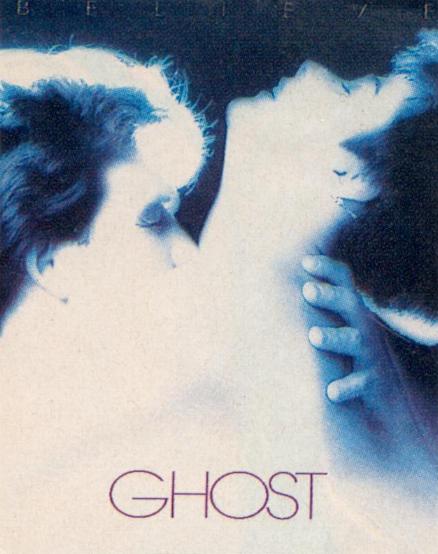
I've long held that this movie, more than anything else, is the cultural marker at the end of the 80s and the beginning of the 90s. A really wonderful film.
Patrick Swayze was one of those artists who continues to be the bread and butter for Overthinkers – a man of deep and profound talents who could have chosen to do anything with his life, and decided to spend it making art for the people. And not alt-local performance art that claims from the standpoint of a shaky and trifling intellectual minority to speak for those who cannot speak for themselves (these people aren’t so bad, of course, but let’s be fair) – actual art for the people – the bulk of people, the great mass of humanity who go about their lives every day without spending many moments with the lyrical, the beautiful, the poetic, or anything of the sort.
The people who beg for stories that speak to their tired and stiffened souls. The people who look to artists not to teach them (though that happens anyway), not to explain them (though that happens anyway), but to show them a new or forgotten way of feeling.
Bookworm shut-ins who feel their heart jump inexplicably at various moments in Point Break, or high school girls raving over Dirty Dancing, or 30-something Baby Boomers reaching a little bit outside themselves and their own prejudices to try to understand one of the rebs in North & South. Or pretty much anybody who ever watched Red Dawn, which is a self-selecting group. There’s very little I can do to identify these people (among whose number I count myself), no epithet I can ascribe to the watcher of Red Dawn than that he or she decided that it was a good idea to watch Red Dawn in the first place. But I digress. We’ve all had our lives bettered by the Swayze. We have been his life’s work.
Patrick Swayze was a Romantic actor, with a capital R – an emotional performer, a man who stretched his sympathies toward physical and verbal resonance – and toward harmony and consonance with those around him. By all accounts, he cared deeply for the way his work made people feel and the service it offered, helping them feel a little better when they felt bad, or a little worse when they weren’t feeling much at all. He intuitively and intellectually understood the power of art to connect people outside of the grasp of what might be termed learning or knowledge.
Patrick Swayze was to acting what “Piano Man” is to music – if “Piano Man” played constantly for thirty years and played a different tune with every turn of the ear you gave it, like a gemstone turned slightly, with the incident angle of its facets casting a different brilliance, a fresh-hewn shape of refracted light.
You may think I am joking, but I am totally serious. Patrick Swayze was a brilliant actor – one of those rare actors in the mold of Harrison Ford or Humphrey Bogart, where he was so much better than the lines he was given to say that seeing them written down is like waking up with a hangover. “Did that really happen? Oh, that was awful! Ack!” No, it wasn’t awful, it was a great party, and you had a great time. And Patrick Swayze said it, and it was a great movie.
When Michael Jackson died, I wrote about how horrible his death was, like David Carradine’s death in Thailand. This time, I won’t do everybody the disservice of lumping it into a trifecta, but I’ll compare Swayze’s death to the death of Ted Kennedy.
Both of them did something remarkable – they were handed an absolutely lethal prognosis, and, faced with their own nigh-unavoidable and imminent deaths, fought like lions to do better work in that last year of life than anybody would have thought possible from them, even had they not been sick.
I haven’t seen The Beast, but if anybody told me Patrick Swayze was going to make a critically acclaimed cable cop drama, I probably wouldn’t have believed them. I have tremendous respect for the guy, as I’ve said, but his career seemed unlikely to produce many more surprises, and he hadn’t made a genuine hit in quite some time.
So, I’m definitely going to track it down and watch it now.
Like Kennedy, he lasted longer than anyone thought he would, and was inspiring in what he managed to accomplish in his last days, but he didn’t so much defy death as fulfill it, giving that one last interview with Barbara Walters before catching pneumonia and going about the unenviable business of shuffling off his mortal coil. He brought his life to conclusion. That, I think, is a blessing, a lucky thing, and a thing to be admired and envied when it happens.
It is always a particularly jarring moment when a sex symbol dies. Western culture at the very least, has many coping mechanisms to deal with age and death, and one of them is, as one gets older or respect the word of elders to an increasing degree, one is often convinced that the achievements of the body, by how fleeting they are, are less important, less valuable, less meaningful. This is really a way of saying good-bye to them more than anything else — and at its worst, it’s a begrudgement of the wondrous gifts of physical life — spiting the people who exemplify them most out of jealousy or frustration.
So, when a sex symbol dies, especially one like Swayze who was always in one degree or another a dancer — a person who used his body very expressively — when he or she dies, it is often hard to regard physical gifts, such as the gift of performance and presence, with full esteem. We are more comfortable with faded, black-and-white pictures of our past athletes — of old-timey ballplayers rounding the bases with baggy pants and scrambly legs — than with contemporary ones, especially if they die older.
Patrick Swayze was not stupid just because he acted in a very physical style and wasn’t an especially verbal performer, just as somebody is not smart just because he or she can talk (as I perhaps have proven by now). And the truth behind the fading of youth into age and health into infirmity and death is not that youth and health matter less, but that they matter too much — too much for anything really fitting to be said in farewell to them.
Well, in such a sad hour, thinking of so great a man who loved this ol’ world so much, I can’t think of anything to send him off with better than a good old trucker song, from a Patrick Swayze movie I will always hold near and dear to my heart – Black Dog, or as I like to call it, “The best movie ever made about trucks starring Patrick Swayze and Meat Loaf.”
(Finally, I’d like to link to the Onion AV Club’s excellent “The Way of the Swayze” article from March 2007. I don’t agree with everything in it, but it’s definitely worth a read.)
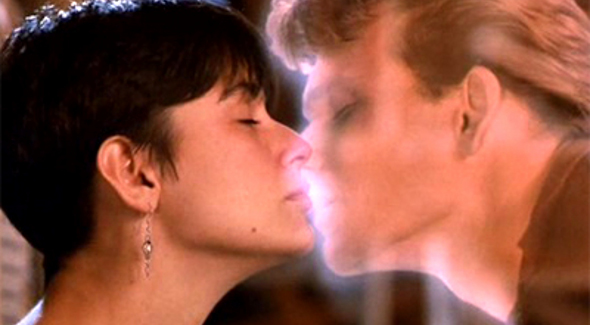
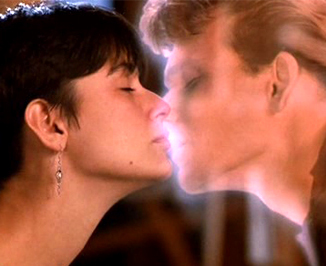
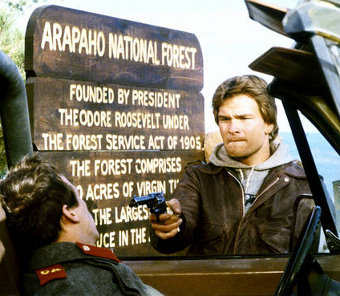
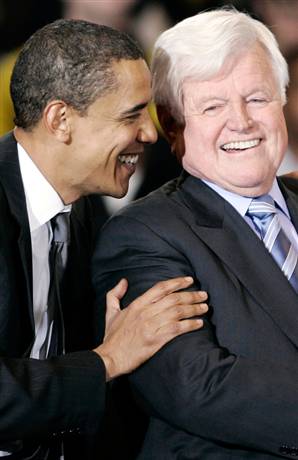
Well said as always, Pete. However, I’m sorry you didn’t address my favorite Swayze film, Roadhouse. I believe you and I once saw a theatrical recreation of the movie, packed with cheering hipsters. I also once saw Point Break in a Washington movie theater, once again packed with cheering hipsters. These are cheesy movies, to be sure. But they are not bad movies. They are shamelessly entertaining, and it is impossible to imagine them working without Swayze. The man was a movie star. Women wanted him, men wanted to be him.
It’s too bad he couldn’t find higher-profile work over the last 10 years, but you have to respect the way he did The Beast while suffering from terminal cancer. He played a lot of tough guys in his career, but maybe he wasn’t acting at all. I remember a scene in Roadhouse where he’s getting stitched up. The doctor offers him Novocaine. He smiles a gentle smile and tells her, “Pain don’t hurt.” Which is a line that’s both ludicrous and awesome, and finally, today, oddly touching.
Road House remains one of my favorite movies. It’s not even a “guilty pleasure” (if such a thing is possible, caveat caveat caveat). It’s a well-made film – good pacing, funny dialogue, decent acting, great fight scenes – about remarkably picayune subject matter. People think it’s trashy because it’s about Kansas bars and guys with mullets. But it’s a better action movie than XXX, which is set in glamorous cities like Prague.
“Ditto.”
Yeah, I thought about talking about Road House, and it’s just too much of a magnus opus to tackle when trying to talk about the guy’s entire life.
Road House is a lot like Bloodsport — there’s the movie that they made to make money, and then there’s the part of it that most people find vaguely creepy and offensive that turns out to be really deep and bizarre and interesting and offers a lot of compelling aesthetic touches, verbal and visual ironies, structural nuances and insights into the human condition.
Matt, I know you’ve mentioned it a bunch of times — the most interesting overarching thing about Road House is how the bar goes from being what most people would think of as a really cool bar — with the people throwing bottles at the cage where people play country music — to an extremely lame one — a neon-clad yuppie sham palace — because of Patrick Swayze’s efforts. How through everything he does, there’s something that gets worse, gets ruined — but exactly what is hard to explain or pin down better than the movie does itself.
Road House is choice. And people should watch it.
Though he was so young, he had such an accomplished and well-lived life. Still, it is so sad to hear about his death. My great aunt just died of Pancreatic cancer, and her sister died of it several years ago. It is such a painful thing to watch, knowing that they are suffering and even with the care of a nurse, it is just knowing that their days are numbered that makes it so hard. Prayers go out to his family.
R.I.P. to Patrick Swayze! He fought a good battle! And I believe he lived his life into something very special that many people can remember.–“pain doesn’t hurt”.
@Pete – One day, I’m totally going to write that article about how the bar in Roadhouse is completely ruined over the course of the movie. (I actually ripped the whole movie to my computer months ago, specifically for this purpose.)
The bar becomes much more profitable, of course. But by the end of the film, you get the feeling none of the locals go there anymore – it’s all these yuppies in skinny ties, probably ordering overpriced chicken fingers to go with their microbrews. Swayze is basically paid to gentrify the place, and nobody really likes gentrification. I honestly wonder if the movie wasn’t designed to be quietly subversive.
Look at it this way: a “roadhouse,” in my mind, is a rough and tumble place. It’s supposed to have some edge to it. Swayze isn’t hired to fix the roadhouse, so much as get rid of it entirely. (His one-man war against organized crime is more of a side project.)
I actually was surprised to find this a very poignant article on Mr. Swayze, great job! I am always impressed by people with terrible illnesses who fight on to make every minute count. A good friend of my father’s recently passed away from pancreatic cancer and he, too, was working up until the bitter end.
One movie you did not mention was Point Break. I have yet to actually see the movie, but I did see Point Break Live in Hollywood a couple weeks ago and it was simply fabulous. I should probably wander down to Blockbuster and check it out before that Blockbuster goes out of business (I canceled Netflix). I’m looking to see Mr. Swayze’s portrayal of Bodhi, and Keanu’s Johnny Utah of course!